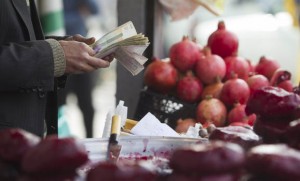 TEHRAN�� The pickpocket, nabbed in the act, pleaded for mercy.
TEHRAN�� The pickpocket, nabbed in the act, pleaded for mercy.�Please, let me go!� he implored of the spectators gathered on the sidewalk. �I am a father of two. I can�t make ends meet.�
Improbably, an onlooker invoking the onset of spring holidays and the philosophy of Russian novelist Leo Tolstoy would help decide the suspect�s fate.
Moments earlier, two elderly men had dragged the assailant from the bus station on Enghelab (Revolution) Avenue, close to the bustle of Tehran University. One of the captors explained that he realized the thief�s intentions just in time.
�He took my wallet from my hip pocket, but I felt his hand and grabbed his wrist,� said the pilferer�s intended quarry, irate over the assault.
The scene early Sunday is illustrative of the profound anxiety in this sprawling capital about what many view as a surge in muggings, pickpocketing and other street crime. Residents generally blame the lawlessness on desperation and joblessness stemming from�Iran�s worsening economic slump, which in turn is linked� to foreign sanctions related to the nation�s controversial�nuclear program.
Iranian authorities have signaled forcefully that mayhem will not be tolerated. Two months ago, two young muggers�were publicly hanged�using construction cranes hoisted above a tranquil green space known as Artists Park, about a mile away from the scene of Sunday�s drama. It was a message execution.
On Sunday, an agitated crowd gathered around the captive pickpocket, a thin, short figure with a colorless face and black beard, wearing worn-out jeans and a blue shirt.
�This man should be given a lesson,� declared a tall bystander. Like others, he argued that this was a matter for the law. Let the police handle the reprobate.
A day earlier, the self-appointed sidewalk prosecutor recalled, he had watched a mugger snatch an old man�s bag and then disappear into the crowd. A lesson must be given.
Another man pleaded for mercy. He noted that it was only a few days until Nowruz, marking the vernal (or spring) equinox and the start of the Persian New Year, the major annual holiday on the Iranian calendar.
Appealing to literary and moral sensibilities as the festive season approached, the impromptu defense counsel asked the others whether they had not read, �What, Then, Must We Do?� a tract on compassion for the indigent penned by Tolstoy, whose work has been widely translated into� Persian and is greatly admired.
�Give him another chance,� the Tolstoy enthusiast appealed. �Let him go.�
This being an election year in Iran, it was decided that a democratic vote would be the proper course of action. An ad hoc jury convened to decide whether to turn the perpetrator over to Iranian justice. Women onlookers watched but did not approach, though their facial expressions seem to betray uniform sympathy with the plight of the accused.
Ultimately, Tolstoy triumphed. Of 15 men present, 10 voted to free the pickpocket. The detainee was sprung. He promptly decamped from the vicinity, clearly ecstatic over his reprieve.
On the sidewalk, the voters and others continued their discussion about the lamentable� scourge of crime on the streets of Tehran.
By Los Angeles Times
The Iran Project is not responsible for the content of quoted articles.










